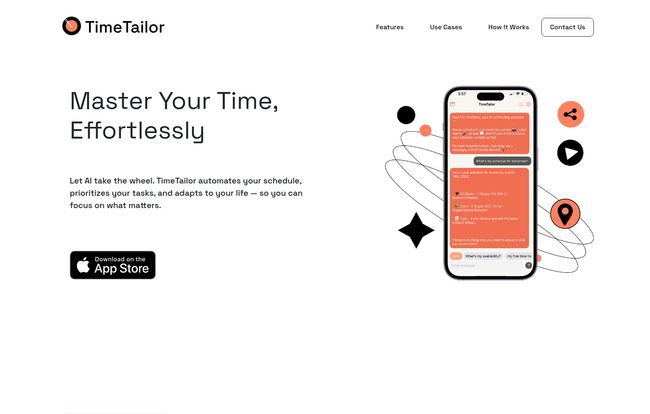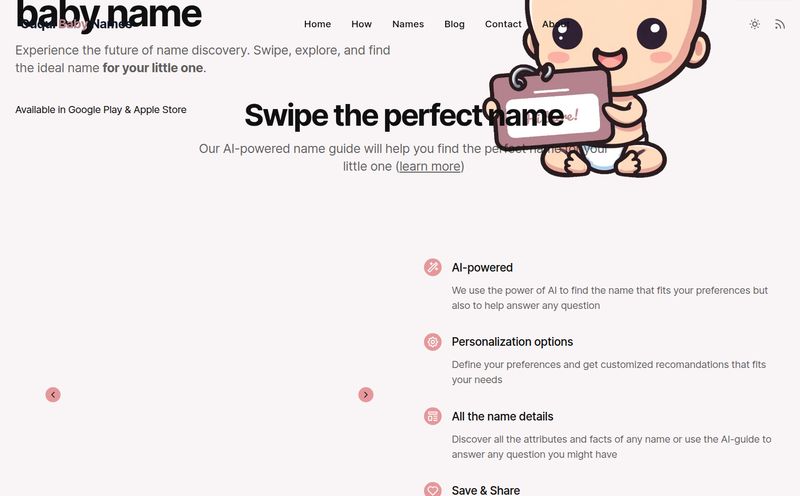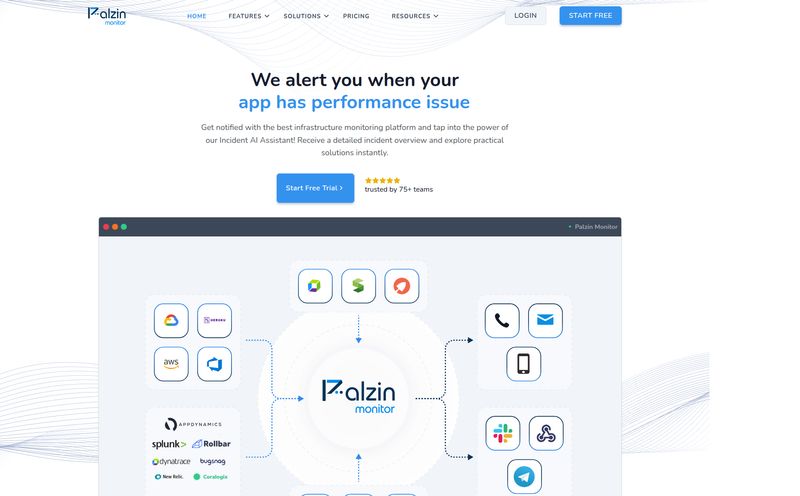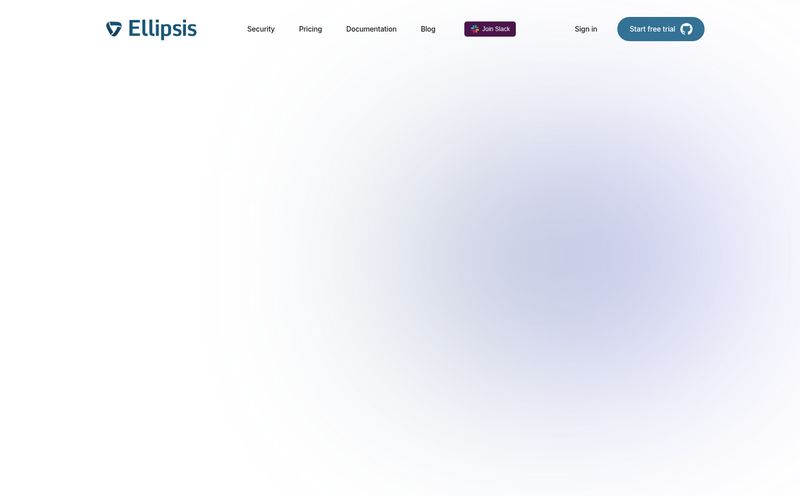We're all drowning. Not in water, but in notifications, to-do lists, and the endless, soul-crushing game of calendar Tetris. For years, I've been on a quest for the perfect productivity system. I've tried bullet journaling, digital planners, complex Gantt charts... you name it, I’ve probably downloaded the app for it. Most of them just end up being another task to manage. Yikes.
So, when I stumbled upon TimeTailor, my inner tech geek and my perpetually-overwhelmed professional self both sat up and paid attention. The tagline? "Master Your Time, Effortlessly." Bold claim. The premise? "Let AI take the wheel." Okay, you have my curiosity. Is this just another shiny new app, or could it actually be the AI co-pilot we've been promised for so long? I had to find out.
So, What Is TimeTailor, Really?
At its heart, TimeTailor isn't just another calendar. We have enough of those. It bills itself as an AI-powered time-management assistant. Think of it less like a digital notebook and more like a real-life personal assistant who, frankly, has a better grasp of your schedule than you do. The whole idea is to stop managing your time and start living it. You dump all your tasks, deadlines, appointments, and even vague goals into it, and the AI handles the rest. It doesn't just slot things in where there’s a gap; it claims to learn your rhythms, your priorities, and as their site says, "how you roll."
The Magic Behind the Curtain: How It Actually Works
The process seems almost too simple, which is either genius or a red flag. Here’s the breakdown:
- Step 1: You Dump Your Brain. This is the cool part. You can send TimeTailor your schedule in almost any format. A text message with your to-do list? Done. A voice note rambling about your week while you're walking the dog? It'll handle it. You can even snap a picture of a handwritten list or a semester syllabus. This multi-input approach is a game-changer for me.
- Step 2: The AI Does the Heavy Lifting. This is where the magic is supposed to happen. TimeTailor's AI parses all that chaotic information, understands the context, prioritizes what's important, and builds a coherent, optimized schedule for you. It's designed to know that "finish Q3 report" is probably more urgent than "buy more coffee."
- Step 3: You Just Show Up. The end goal. You get a clean, manageable schedule and smart reminders that guide you through your day. No more decision fatigue about what to work on next. You just... do the thing.

Visit TimeTailor
Key Features That Caught My Eye
Alright, let's get into the nitty-gritty. A few features stood out to me from their website, and they're worth talking about.
Smart Scheduling and True Prioritization
This is the core promise. We've all been there: staring at a list of 20 tasks, all seemingly urgent. TimeTailor’s AI is designed to cut through that noise. It doesn't just see a list; it sees a hierarchy. It bumps what truly matters to the top and fits the smaller stuff in around it. If it works as advertised, this could be the single biggest weapon against procrastination and burnout. It’s like having a project manager for your entire life, not just your 9-to-5.
Speaking Your Schedule into Existence
I cannot overstate how much I love the idea of voice and picture input. The friction of opening an app, navigating to the right day, and typing out an event is a small but significant barrier. Being able to just say, "Hey, schedule a haircut for next Tuesday afternoon and remind me to prep for the client call on Wednesday morning," is huge. Sending a picture of your kids' soccer schedule and having it auto-populate? That's not just convenient; it feels like the future.
Seamless Calendar Sync and No More Double Bookings
Thank goodness. Any new scheduling tool that doesn't play well with existing calendars is dead on arrival. TimeTailor says it syncs with Google Calendar and others, which is table stakes, but the key is the promise of “no double bookings.” Its AI is smart enough to see your existing commitments and schedule around them, avoiding that embarrassing "Oh, sorry, I have to reschedule" email. A small detail, but one that shows they understand their users' pain points.
Adaptive Reminders That Don't Annoy You
We've all been bullied by our phones. Constant, nagging reminders that you start to ignore out of sheer annoyance. TimeTailor promises something different: "smart notifications that actually help." This implies contextual awareness. A reminder to leave for a meeting that accounts for current traffic, perhaps? Or a gentle nudge about a task when it sees you have a pocket of free time? If they get this right, it's a massive quality-of-life improvement.
Who Is This Really For?
Based on their site, TimeTailor is targeting a few key groups, but I think its appeal could be broader.
- Students: Juggling classes, study blocks, assignments, and a social life is chaos. The idea of just sending a picture of a syllabus and letting the AI map out your semester is definitly compelling.
- The Side Hustlers: This one hits close to home. Anyone balancing a full-time job with a freelance gig or a creative passion knows the struggle. TimeTailor aims to protect your time for deep work on your side project while ensuring you don't drop the ball on your main job.
- The 'Max Performance' Crowd: Athletes, entrepreneurs, high-achievers. People who need to meticulously balance training, work, recovery, and personal goals. For them, optimization isn't a luxury; it's a necessity.
But honestly? I see this being for overwhelmed parents, busy freelancers, or anyone who feels like their time is a runaway train. If you have more things to do than hours in the day, this tool is talking your language.
The Good, The Bad, and The AI
No tool is perfect. As an SEO and tech analyst, I've learned to temper my excitement with a healthy dose of skepticism. Here’s my breakdown of the potential highs and lows.
The Wins: Why I'm Genuinely Excited
The biggest pro is the potential to reclaim mental energy. The sheer cognitive load of constantly planning and re-planning your day is exhausting. Offloading that to a capable AI could be liberating. The flexible input methods are a close second—it fits into your life, rather than forcing you to fit into its system. And the promise of an AI that truly adapts to your personal style over time? That's the holy grail of productivity software.
The Potential Pitfalls: A Few Things to Consider
First, there's the trust fall. Handing over the reins of your schedule to an AI requires a leap of faith. For control freaks (ahem, like me), this can be a tough pill to swallow. What if it misinterprets something? The system is also only as good as the data you give it. If you forget to tell it about your dentist appointment, it can't work its magic. This "garbage in, garbage out" principle is a real factor.
And then there's the elephant in the room: privacy. You're feeding an AI some of your most personal data—your appointments, your goals, your daily habits. You need to be comfortable with their privacy policy. I'd want to know exactly how that data is stored, used, and protected before I commit fully.
What's the Damage? A Look at TimeTailor's Pricing
And here's where we hit a small snag. In the spirit of full transparency, when I tried to find more details on their pricing, the link was broken—I just got a 404 error. It happens. Since the main call-to-action is an App Store button, it’s likely a free download with a premium subscription model (a common strategy), but I can't confirm that. For a tool this potentially powerful, I'd expect to pay a reasonable monthly or annual fee. For now, we'll have to wait and see.
My Final Verdict: Is TimeTailor Worth a Shot?
Despite the lack of pricing info, I'm optimistic. TimeTailor isn't just iterating on the digital calendar; it's trying to create a new category of personal management. It's ambitious. The focus on effortless input and intelligent automation is exactly what the productivity space needs.
It won't be for everyone. If you love the tactile ritual of a paper planner, this might feel too detached. But if you're a tech-forward person who's tired of the constant juggle and ready to let an AI co-pilot take over the navigation, then I think TimeTailor is absolutely worth keeping an eye on. It might just be the thing that finally helps you focus on what truly matters, instead of just planning for it.
Frequently Asked Questions about TimeTailor
- 1. What exactly is TimeTailor?
- TimeTailor is an AI-powered assistant designed to automatically organize your schedule. You provide your tasks, appointments, and deadlines through text, voice, or even pictures, and its AI creates an optimized daily and weekly plan for you.
- 2. How is TimeTailor different from Google Calendar or other calendar apps?
- While it syncs with traditional calendars, TimeTailor is different because it actively manages and prioritizes for you. Instead of you manually finding slots for tasks, the AI assistant analyzes your entire list of commitments and intelligently builds the schedule itself, adapting to changes in real-time.
- 3. Is TimeTailor available for Android users?
- Currently, the website prominently features a link to the Apple App Store, suggesting it is primarily focused on iOS devices. There is no mention of an Android version at this time, but that could change in the future.
- 4. How does the voice and picture input feature work?
- You can record a voice memo or send a text message listing your tasks, and the AI will interpret the information to schedule everything. For pictures, you could snap a photo of a meeting agenda, a class syllabus, or a handwritten to-do list, and TimeTailor will extract the relevant data to populate your calendar.
- 5. Is my personal schedule data safe with TimeTailor?
- This is a valid concern for any AI tool. While TimeTailor is built on managing personal data, users should always review the company's Privacy Policy (available on their website) to understand how their information is collected, stored, and protected before using the service.
- 6. How much does TimeTailor cost?
- At the time of this review, the pricing information was not available on their website. Given its distribution through the App Store, it's likely to follow a 'freemium' model, with a free basic version and a premium subscription for advanced features.
Conclusion
In a world obsessed with doing more, TimeTailor offers a compelling alternative: organize smarter, not harder. By handing over the mental load of scheduling to a capable AI, it promises to give us back our most valuable resource—time. And that’s a proposition I’m willing to bet on.



